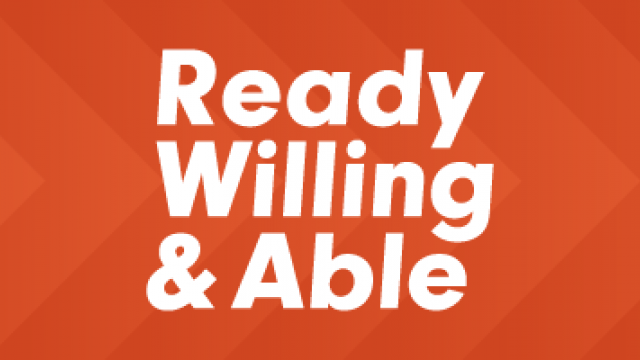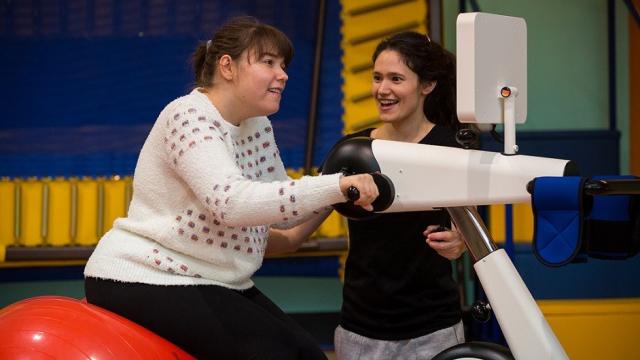
Ian's story
SeeAbility’s work with Ian is all about independence. Through our expertise in both autism and sight loss, we’ve supported him to live an active life.
"I think it’s amazing doing it all on my own"
Ian Morrison’s kitchen smells delicious. He’s sitting down to enjoy the omelette he’s just made with a little help from Kim, his support worker. She and the rest of the SeeAbility team have taught Ian how to use his microwave and sourced a special omelette maker for him, so omelettes are on the menu in Ian’s flat at least once a week.
Ian moved into SeeAbility’s supported living service in Exeter in 2010. Before that he had spent ten years with the WESC Foundation, a centre for people with visual impairments also in Exeter. After WESC, Ian could have moved back to his family home in Berkshire.
"But I said to my parents that I would like to stay in Exeter because my dentist is here, my doctor is here, I’ve been taught independence down here. That’s why I wanted to stay here."
So Ian’s parents and sister moved down to Devon to be closer to him and he moved into his flat. It’s one of seven self-contained apartments for people with disabilities, each one part-owned by its tenant and the landlord, Sovereign Housing Association.
Our person-centred approach
Vicky is the deputy manager of the service. She explains how it works:
"Our tenants all have different support hours depending on their needs. We go in and support them to be as independent as possible within their own lives. We know that everyone is unique, so all their support is tailored to suit them specifically."
When Ian first moved in with SeeAbility, he liked sticking to his routine, but over the years, he has become more open to new things. During the summer he had a horse and carriage ride and loved it; next month he’s taking a trip on a steam train. “When he first came here, Ian wouldn’t have considered doing those things because they’re so different and outside of his comfort zone,” Vicky explains. “But now he’s stepping out of his shell and showing what he’s capable of. He’s quite an incredible young man.’
Getting out and about
Omelette eaten, Ian dons his hi-vis coat for his walk to work. He describes his commute as his best achievement, because having practised the route with SeeAbility staff, he now does it independently:
"I think it’s amazing doing it all on my own. That’s what SeeAbility encourages people to do. It gives members of the public an insight into what independent and supported living means."
Ian’s 20-minute walk takes him to the WESC Foundation charity shop, where he works four mornings a week. “The manager Jenny and I operate the till, which I’m a pro at!” says Ian. “I enjoy the social interaction with customers and the banter that me and my colleagues have.”
Ian is also a pro on VI Radio, having hosted his own weekly show since WESC opened the station back in 2003. He remembers his 15-year-old self sitting in a maths lesson and hearing VI Radio’s first ever track: Baker Street by Gerry Rafferty. In the early days of VI Radio, Ian DJed from a tiny practice room in the music department. Now he’s in ‘bigger and better rooms’ in the college technology centre.
"I enjoy choosing the music because it’s my hobby. It’s enjoyable because I’m independent on there and I don’t need someone to watch me at all."

Speaking out
Experiences like these have helped build Ian’s confidence, so much so that he has become a spokesperson for other people with disabilities. For four years he was co-chair of the Taking Control group, which sees people SeeAbility support across the south of England coming together to share news and issues with management.
"The Taking Control group is important because people can have a voice. I think I’ve done really well by getting tenants’ issues raised by management quite quickly. It’s good because I get to see so many members of senior leadership there and other service managers and service users – and we get a buffet lunch!"
Ian’s experiences with SeeAbility have been so positive he wants to share his story more widely, possibly going into schools to give presentations about supported living. He says:
"They have taught me how to live and survive on my own – they’ve been a massive help."

Please donate today
If you support SeeAbility you’re playing a hugely important role in helping us achieve our vision of inclusive communities where everyone can participate as equal citizens.



